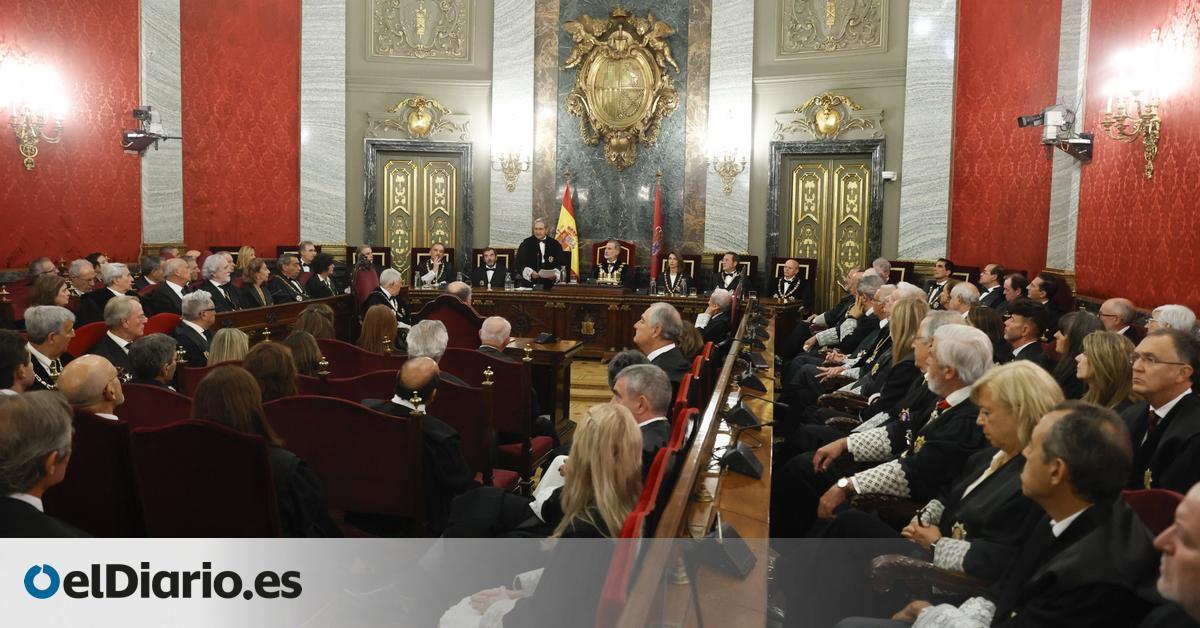
There is no draft or preliminary text – at least, that has been made public – but the hypothesis that the PSOE and the pro-independence forces address the final shelving of the process through an amnesty has already provoked critical reactions in the most conservative sectors. of the judiciary and the prosecution. A public position that coincides with the movements of the Popular Party, which this week has toughened its speech trying to delve into the delegitimization of democratic institutions such as the Constitutional Court. Precisely, the body that will have the last word on any legal initiative to decriminalize the causes arising from October 1, 2017.
The PP encourages a frontist speech against the possible Sánchez government in the face of the Feijóo investiture fiasco
Further
“It is very difficult to agree with it,” said last Monday the new acting president of the General Council of the Judiciary (CGPJ) when asked by journalists about the possible preparation and promulgation of an amnesty law. Minutes later, in his opening speech for the course at the University of Valladolid —where he is a professor of Civil Law—, Vicente Guilarte used a classic of literature such as One hundred years of lonelinessby Gabriel García Márquez, to affirm: “The illusionists of law are going to appear again with their magical tricks to convince us of the constitutional goodness of the amnesty that, in my opinion, the most prudent people question.”
Two days later, this Wednesday, Guilarte was asked again about a hypothetical amnesty in an interview on Cadena SER. He stated that it is a debate that should not be faced “in a dramatic way,” although he insisted that it seems “questionable” to address this path “with no other justification than the mere electoral situation.” In his opinion, it is an “institution” that requires two elements that “is not easy to prove” in the current scenario: general interest and a certain consensus, although he argued that the “need and urgency” of the “votes” is known. of the former Catalan president Carles Puigdemont.
Guilarte, 70, became the first judicial authority in the State last July when he was elected president of the governing body of judges, an institution that has been in an unprecedented situation of interim status for five years due to the PP’s blockade of its renewal. Lawyer and teacher, he was once elected member of the CGPJ at the proposal of the main right-wing party. Very close to Mariano Rajoy’s family, one of his main clients in recent years has been the College of Property Registrars, where one of the brothers of the former Prime Minister was a senior official.
In the field of the judiciary, the most intense criticism of the hypothetical criminal relief of the process has come from the Professional Association of the Judiciary (APM), with a conservative tendency and majority in the race, with 1,355 members out of a total of 5,408 judges and magistrates active. Its president, María Jesús del Barco, was very forceful this Tuesday in an interview on La Noche in 24 hours (TVE), in which she stated that the amnesty means “annihilating the separation of powers” and “denying the existence of the Judiciary.” ”. “The Constitution is not a piece of gum that stretches and shrinks, nor a rubber band that breaks from pulling so much. Democracy cannot allow these games,” she stated.
María Jesús del Barco, president of the Professional Association of the Judiciary, considers that an amnesty is not possible in Spain: “If our Constitution prohibits general pardons, which has a milder consequence than what the amnesty has…”https: //t.co/5SYQhFRtSQ pic.twitter.com/udfCS1M4Zm
— The night in 24 hours (@Lanoche_24h) September 12, 2023
During her intervention, Del Barco was asked about the constitutionality of the amnesty and her response was blunt: “clearly, it does not fit” in the Magna Carta. Her thesis is that since the Constitution “prohibits general pardons, which have milder consequences,” it also prevents amnesty. “I believe that if it prohibits the least, logically, it will prohibit the most,” said this magistrate, who is also dean of the judges of Madrid.
It is the same interpretation that Congressional lawyers made in 2021 when they recommended to the Chamber Board not to process an amnesty law proposed by ERC and Junts. Some experts have been considering, however, that the fact that neither the Constitution nor the Penal Code make any reference to the amnesty – neither allowing it nor prohibiting it – opens the door to its constitutionality. This is how renowned jurists such as the former president of the Constitutional Court and the Supreme Court Pascual Sala or the former vice president of the guarantee court Juan Antonio Xiol have positioned themselves.
The spokesperson for the Francisco de Vitoria Judicial Association (859 members), Jorge Fernández Vaquero, has been less categorical than Del Barco, who in an interview in Efe stated that the amnesty for the leaders and the so-called second line of leaders of the process “is a measure that is difficult to fit into the Constitution” and that is “worrying” in the judicial career. Fernández Vaquero made it clear that an amnesty law is a political issue that the Cortes will have to handle but, if necessary, he warned that his association will be vigilant so that the Constitution is complied with.
Last week, the issue of the hypothetical amnesty hovered over almost all the conversations at the opening ceremony of the judicial year. Although the word itself was not cited in the speeches given by the Chief Justice and the Attorney General, it did appear in the informal chats at the reception afterwards. The general view is that it is a possibility that generates concern in the High Court, which was the judicial body that designed the entire legal architecture against the process and that was later endorsed by the Constitutional Court.
In fact, the judges of the Criminal Court who judged the process referred tangentially to the amnesty in the report in which they opposed the pardons of Oriol Junqueras and the rest of the leaders. The court that tried these events criticized the “preference for amnesty” of the former leader of Òmnium Cultural, Jordi Cuixart. According to the judges, it is a measure that “disregards a historical teaching that shows that, in many cases, amnesty laws have been the means used by dictatorial regimes to erase very serious crimes against people and their fundamental rights.”
Criticism of the Association of Prosecutors
In the area of the Prosecutor’s Office, the main objections to a hypothetical amnesty have come from the Association of Prosecutors (AF), with a conservative tendency and majority in the race. Its president, Cristina Dexeus, has given several interviews in recent days in which she has strongly criticized the possible penal relief of the process.
“The rule of law is in danger because making concessions of this type to those who have attacked the Constitution is siding with them, and therefore, against the Constitution and the rule of law,” he said on September 8 in an interview in Confilegal. . “Being pro-independence cannot be a license to commit crimes, which is what they intend with the amnesty,” he added.
A day before, in another interview on Onda Cero, the president of the AF defended that the Constitution “does not cover” a possible amnesty. And for this she used the same argument as her counterpart in the APM. “If the Constitution prohibits the least [en alusión a los indultos generales]prohibits at most the amnesty, the clean slate, the oblivion, the disappearance of the crime and all its consequences.
In another intervention in Cope, Dexeus was asked if “the separation of powers is getting further and further away” regarding issues such as pardons or possible amnesty. And in her response, she did not hesitate to charge against the Executive. “For some time now there has been a tendency to undermine the separation of powers, to undermine the credibility and proper exercise of the functions of the institutions with this constant discredit by members of the Government, by politicians, about the actions of those who are “They are in charge of dispensing justice,” he answered.
The Association of Prosecutors also published a statement last week in which it criticized the “silence” of the State Attorney General, Álvaro García Ortiz, in the face of the “seriousness” of the request made by Puigdemont, who asked the Government to maneuver “through of the Prosecutor’s Office and the State Attorney’s Office” to achieve “the complete and effective abandonment of judicial channels” in the face of the events of October 2017. Sources from the Prosecutor’s Office reacted to this statement by stating that the institution will only make a statement, if necessary. that it has to do so, if the law is finally approved and it is appealed before the Constitutional Court.
The AF is the same association that last April invited the leader of the PP, Alberto Núñez Feijóo, to a dinner-discussion at a hotel in Madrid. An appointment that was not scheduled among his activities. According to what El País revealed, prosecutors with high-level positions in the Supreme Court such as Antonio Narváez or Consuelo Madrigal took advantage of that meeting to express their ideological closeness with Feijóo and criticize the Government for the “lack of democracy in legislative procedures” or for its alliances “with the philo-etarras of Bildu.”
The meeting, which Dexeus also attended, angered the Executive, who described as “very serious” a meeting in which some prosecutors made comments that conflict with the Code of Ethics of the prosecutor’s career, which reminds that members of the Public Ministry “must refrain from carrying out any action that may be perceived as affecting their independence and impartiality.”
Source: www.eldiario.es

